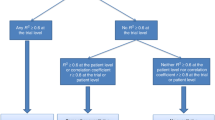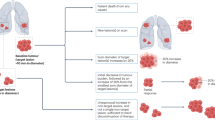Abstract
Progression-free survival (PFS) is frequently used as a primary end point in oncology clinical trials. Employing PFS instead of overall survival as the primary outcome has the advantage that trial completion can be quicker with fewer patients required, and it is cheaper. PFS is sensitive to cytostatic as well as cytotoxic mechanisms of therapeutic intervention and directly measures the effect of the investigational treatment. Despite these practical advantages, it is unclear whether or not extending PFS provides discernable clinical benefit. New treatments that increase PFS may not be of sufficient value to patients with advanced-stage cancer unless accompanied by tangible quantity or quality of life advantages. Any symptom relief that patients gain from treatment resulting in tumor shrinkage or stabilization must be balanced against the toxic effects that drug therapy itself creates. Consequently, improved assessment of new treatments using patient-reported outcomes alongside PFS is crucial to enable communication between clinicians and patients and optimal decision-making about therapeutic options.
Key Points
-
Many clinical trials of novel cancer treatment report outcomes in terms of progression-free survival (PFS) rather than overall survival
-
Few trials have good quality-of-life (QoL) data collected via patient-reported outcome measures
-
There are insufficient studies directly measuring the value and putative benefits for patients of tumor stabilization or PFS
-
QoL data may be vital to assist with patient decision making as outcomes that clinicians consider important might not provide benefits to patients who may suffer the side effects of treatment
-
Discussing the harms and benefits of treatment with sick and anxious patients is challenging
-
More research on patients' experiences captured with standardized measures is needed and such data should be integrated and reported alongside more traditional trial outcomes to enable better decision making
This is a preview of subscription content, access via your institution
Access options
Subscribe to this journal
Receive 12 print issues and online access
$209.00 per year
only $17.42 per issue
Buy this article
- Purchase on Springer Link
- Instant access to full article PDF
Prices may be subject to local taxes which are calculated during checkout
Similar content being viewed by others
References
Booth, C. M. & Tannock, I. Reflections on medical oncology: 25 years of clinical trials—where have we come and where are we going? J. Clin. Oncol. 26, 6–8 (2008).
Soria, J. C., Massard, C. & Le Chevalier, T. Should progression-free survival be the primary measure of efficacy for advanced NSCLC therapy? Ann. Oncol. 21, 2324–2332 (2010).
Sargent, D. J. & Hayes, D. F. Assessing the measure of a new drug: is survival the only thing that matters? J. Clin. Oncol. 26, 1922–1923 (2008).
Peppercorn, J. M. et al. American Society of Clinical Oncology statement: toward individualized care for patients with advanced cancer. J. Clin. Oncol. 29, 755–760 (2011).
Burstein, H. J. Bevacizumab for advanced breast cancer: all tied up with a RIBBON? J. Clin. Oncol. 29, 1232–1235 (2011).
Ocana, A. & Tannock, I. F. When are “positive” clinical trials in oncology truly positive? J. Natl Cancer Inst. 103, 16–20 (2011).
Kirkbride, P. & Tannock, I. F. Trials in palliative treatment–have the goal posts been moved? Lancet Oncol. 9, 186–187 (2008).
Hensley, M. L. Big costs for little gain in ovarian cancer. J. Clin. Oncol. 29, 1230–1232 (2011).
Fojo, T. & Parkinson, D. R. Biologically targeted cancer therapy and marginal benefits: are we making too much of too little or are we achieving too little by giving too much? Clin. Cancer Res. 16, 5972–5980 (2010).
Fojo, T. & Grady, C. How much is life worth: cetuximab, non-small cell lung cancer, and the $440 billion question. J. Natl Cancer Inst. 101, 1044–1048 (2009).
Saad, E. D., Katz, A., Hoff, P. M. & Buyse, M. Progression-free survival as surrogate and as true end point: insights from the breast and colorectal cancer literature. Ann. Oncol. 21, 7–12 (2010).
Ohorodnyk, P., Eisenhauer, E. A. & Booth, C. M. Clinical benefit in oncology trials: is this a patient-centred or tumour-centred end-point? Eur. J. Cancer 45, 2249–2252 (2009).
Burris, H. 3rd et al. Improvements in survival and clinical benefit with gemcitabine as first-line therapy for patients with advanced pancreas cancer: a randomized trial. J. Clin. Oncol. 15, 2403–2413 (1997).
Hudes, G. et al. Temsirolimus, interferon alfa, or both for advanced renal-cell carcinoma. N. Engl. J. Med. 356, 2271–2281 (2007).
Verma, S. et al. In the end what matters most? A review of clinical endpoints in advanced breast cancer. Oncologist 16, 25–35 (2011).
Bergmann, L., Hirschfeld, S., Morris, C., Palmeri, S. & Stone, A. Progression-free survival as an end-point in clinical trials of biotherapeutic agents. Eur. J. Cancer Suppl. 5, 23–28 (2007).
Dancey, J. E. et al. Recommendations for the assessment of progression in randomised cancer treatment trials. Eur. J. Cancer 45, 281–289 (2009).
Panageas, K. S., Ben-Porat, L., Dickler, M. N., Chapman, P. B. & Schrag, D. When you look matters: the effect of assessment schedule on progression-free survival. J. Natl Cancer Inst. 99, 428–432 (2007).
Chakravarty, A. & Sridhara, R. Use of progression-free survival as a surrogate marker in oncology trials: some regulatory issues. Stat. Methods Med. Res. 17, 515–518 (2008).
Oxnard, G. R. et al. Variability of lung tumor measurements on repeat computed tomography scans taken within 15 minutes. J. Clin. Oncol. 29, 3114–3119 (2011).
Buyse, M. et al. Progression-free survival is a surrogate for survival in advanced colorectal cancer. J. Clin. Oncol. 25, 5218–5224 (2007).
Hurvitz, S. A. Evolving options for the treatment of metastatic breast cancer: Progression-free survival as an endpoint. Cancer Treat. Rev. 37, 495–504 (2011).
Bast, R. C. et al. Clinical trial endpoints in ovarian cancer: report of an FDA/ASCO/AACR Public Workshop. Gynecol. Oncol. 107, 173–176 (2007).
Siena, S. et al. Association of progression-free survival with patient-reported outcomes and survival: results from a randomised phase 3 trial of panitumumab. Br. J. Cancer 97, 1469–1474 (2007).
Odom, D. et al. Health-related quality of life and colorectal cancer-specific symptoms in patients with chemotherapy-refractory metastatic disease treated with panitumumab. Int. J. Colorectal Dis. 26, 173–181 (2011).
Motzer, R. J. et al. Sunitinib versus interferon alfa in metastatic renal-cell carcinoma. N. Engl. J. Med. 356, 115–124 (2007).
Miller, K. et al. Paclitaxel plus bevacizumab versus paclitaxel alone for metastatic breast cancer. N. Engl. J. Med. 357, 2666–2676 (2007).
Jones, A. & Ellis, P. Potential withdrawal of bevacizumab for the treatment of breast cancer. BMJ 343, d4946 (2011).
Salles, G. et al. Rituximab maintenance for 2 years in patients with high tumour burden follicular lymphoma responding to rituximab plus chemotherapy (PRIMA): a phase 3, randomised controlled trial. Lancet 377, 42–51 (2011).
Markman, M. et al. Phase III randomized trial of 12 versus 3 months of maintenance paclitaxel in patients with advanced ovarian cancer after complete response to platinum and paclitaxel-based chemotherapy: a Southwest Oncology Group and Gynecologic Oncology Group trial. J. Clin. Oncol. 21, 2460–2465 (2003).
Ozols, R. F. Maintenance therapy in advanced ovarian cancer: progression-free survival and clinical benefit. J. Clin. Oncol. 21, 2451–2453 (2003).
Stinchcombe, T. E. & West, H. L. Maintenance therapy in non-small-cell lung cancer. Lancet 374, 1398–1400 (2009).
Ciuleanu, T. et al. Maintenance pemetrexed plus best supportive care versus placebo plus best supportive care for non-small-cell lung cancer: a randomised, double-blind, phase 3 study. Lancet 374, 1432–1440 (2009).
Fallowfield, L. Quality of life: a new perspective for cancer patients. Nat. Rev. Cancer 2, 873–879 (2002).
Basch, E. Patient-reported outcomes in drug safety evaluation. Ann. Oncol. 20, 1905–1906 (2009).
Patil, S. et al. TWiST analysis to estimate overall benefit for metastatic renal cell carcinoma (mRCC) patients (pts) treated in a phase III trial of sunitinib versus interferon-alfa (IFN-{alpha}) [abstract]. J. Clin. Oncol. 28 (Suppl.), a4594 (2010).
Joly, F., Vardy, J., Pintilie, M. & Tannock, I. F. Quality of life and/or symptom control in randomized clinical trials for patients with advanced cancer. Ann. Oncol. 18, 1935–1942 (2007).
Osoba, D. Health-related quality of life and cancer clinical trials. Ther. Adv. Med. Oncol. 3, 57–71 (2011).
Wenzel, L. B., Huang, H. Q., Armstrong, D. K., Walker, J. L. & Cella, D. Health-related quality of life during and after intraperitoneal versus intravenous chemotherapy for optimally debulked ovarian cancer: a Gynecologic Oncology Group Study. J. Clin. Oncol. 25, 437–443 (2007).
Saltz, L. B. Progress in cancer care: the hope, the hype, and the gap between reality and perception. J. Clin. Oncol. 26, 5020–5021 (2008).
Olsen, E. M., Lin, N. U., Krop, I. E. & Winer, E. P. The ethical use of mandatory research biopsies. Nat. Rev. Clin. Oncol. 8, 620–625 (2011).
Catt, S., Langridge, C., Fallowfield, L., Talbot, D. C. & Jenkins, V. Reasons given by patients for participating, or not, in phase 1 cancer trials. Eur. J. Cancer 47, 1490–1497 (2011).
Sheik-Yousouf, A., Gandhi, S., Dukhovny, S. & Verma, S. A comparison of physician and patient perceptions of clinically important endpoints in the treatment of metastatic breast cancer (MBC) [abstract 63]. Eur. J. Cancer Suppl. 8, 77 (2010).
Jenkins, V. A., Solis Trapala, I., Parlour, L., Langridge, C. I. & Fallowfield, L. J. The views of patients and the general public about expensive anti-cancer drugs in the NHS: a questionnaire based study. J. R. Soc. Med. Sh. Rep. 2, 69 (2011).
Matsuyama, R., Reddy, S. & Smith, T. J. Why do patients choose chemotherapy near the end of life? A review of the perspective of those facing death from cancer. J. Clin. Oncol. 24, 3490–3496 (2006).
Meropol, N. J. et al. Cancer patient preferences for quality and length of life. Cancer 113, 3459–3466 (2008).
Mack, J. W., Weeks, J. C., Wright, A. A., Block, S. D. & Prigerson, H. G. End-of-life discussions, goal attainment, and distress at the end of life: predictors and outcomes of receipt of care consistent with preferences. J. Clin. Oncol. 28, 1203–1208 (2010).
Koedoot, C. G. et al. The content and amount of information given by medical oncologists when telling patients with advanced cancer what their treatment options are. Palliative chemotherapy and watchful-waiting. Eur. J. Cancer 40, 225–235 (2004).
Jenkins, V. et al. What oncologists believe they said and what patients believe they heard: an analysis of phase I trial discussions. J. Clin. Oncol. 29, 61–68 (2011).
Fallowfield, L. et al. Discussing expensive anti-cancer drugs. Br. J. Healthcare Management 17, 206–212 (2011).
Velikova, G. Use of electronic quality of life applications in cancer research and clinical practice. Expert Rev. Pharmacoecon. Outcomes Res. 4, 403–411 (2004).
Author information
Authors and Affiliations
Contributions
Both authors contributed equally to researching data for the article, writing, editing and reviewing the manuscript before and during the peer review and editing process.
Corresponding author
Ethics declarations
Competing interests
The authors declare no competing financial interests.
Rights and permissions
About this article
Cite this article
Fallowfield, L., Fleissig, A. The value of progression-free survival to patients with advanced-stage cancer. Nat Rev Clin Oncol 9, 41–47 (2012). https://doi.org/10.1038/nrclinonc.2011.156
Published:
Issue Date:
DOI: https://doi.org/10.1038/nrclinonc.2011.156
This article is cited by
-
Training and external validation of pre-treatment FDG PET-CT-based models for outcome prediction in anal squamous cell carcinoma
European Radiology (2023)
-
Nutritional status according to the mini nutritional assessment (MNA)® as potential prognostic factor for health and treatment outcomes in patients with cancer – a systematic review
BMC Cancer (2020)
-
Patient-reported outcomes and health-related quality of life for cetuximab versus bevacizumab in metastatic colorectal cancer: a prospective cohort study
Journal of Cancer Research and Clinical Oncology (2019)
-
Do drugs offering only PFS maintain quality of life sufficiently from a patient’s perspective? Results from AVALPROFS (Assessing the ‘VALue’ to patients of PROgression Free Survival) study
Supportive Care in Cancer (2018)
-
Therapeutic aims of drugs offering only progression-free survival are misunderstood by patients, and oncologists may be overly optimistic about likely benefits
Supportive Care in Cancer (2017)



